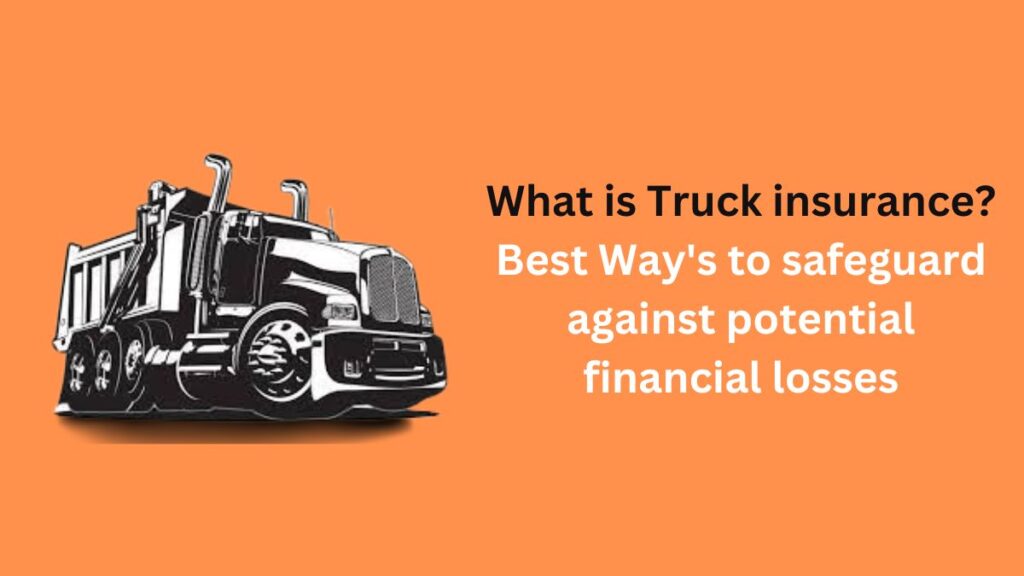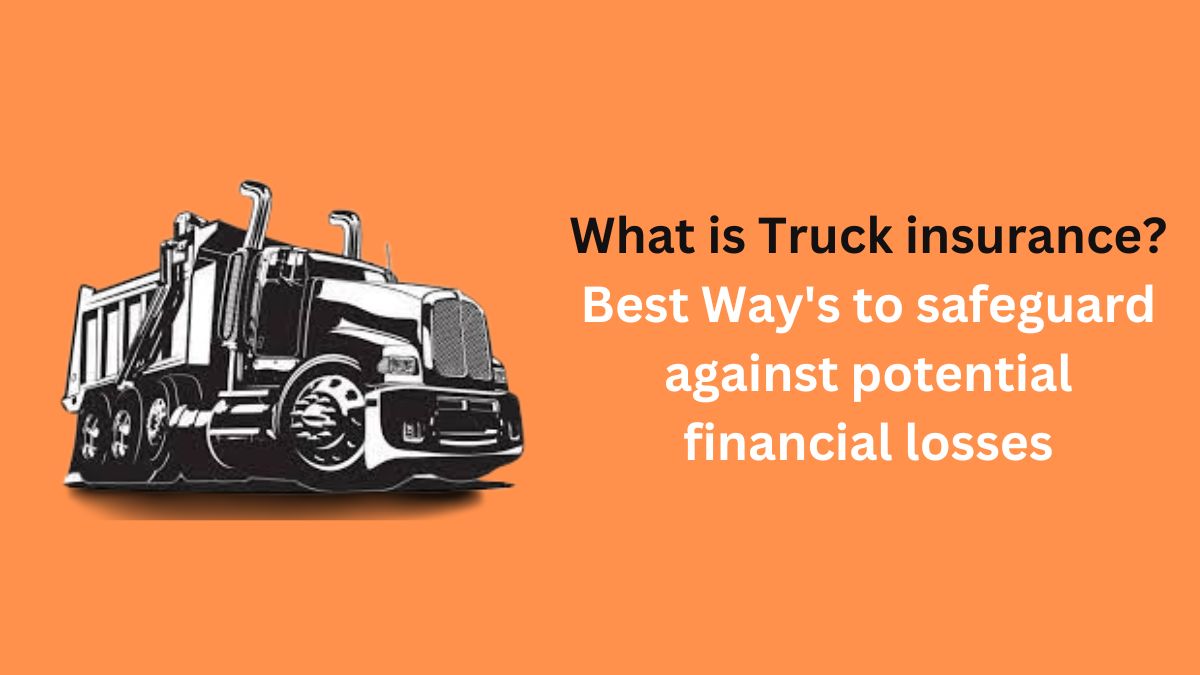Understanding truck insurance begins with recognizing its significance in the trucking industry. Truck insurance serves as a safeguard against potential financial losses resulting from accidents, property damage, or liabilities incurred during the operation of commercial vehicles.

Without adequate insurance coverage, trucking businesses risk significant financial repercussions that could jeopardize their operations and livelihoods.
Types of Truck Insurance Coverage
The diverse nature of trucking operations necessitates different types of insurance coverage to address various risks and liabilities.
Truck insurance, for instance, is essential for covering damages or injuries caused to others in accidents where the insured truck is at fault. Physical damage coverage, on the other hand, protects the truck itself against damages resulting from collisions, theft, vandalism, or other perils.
Cargo insurance is another critical aspect of truck insurance, providing coverage for the goods being transported in case of damage, theft, or loss during transit. This type of coverage is particularly important for trucking businesses involved in hauling valuable or sensitive cargo.
Additionally, trailer interchange insurance offers protection when a trucker is hauling a trailer owned by someone else, while bobtail insurance provides coverage when operating the truck without a trailer.
Factors Affecting Truck Insurance Rates
Several factors influence the cost of truck insurance premiums, reflecting the level of risk associated with insuring commercial vehicles. Driving record plays a significant role, with a clean history typically resulting in lower premiums, while accidents or traffic violations can lead to higher rates.
The type of truck being insured also affects insurance rates, with factors such as make, model, age, and condition taken into account by insurance providers.
Cargo type is another critical determinant of insurance rates, as hauling hazardous materials or high-value cargo poses greater risks and liabilities. Additionally, the coverage limits chosen by trucking businesses can impact insurance premiums, with higher limits resulting in higher costs.
By understanding these factors, truck owners can take steps to mitigate risks and secure affordable insurance coverage for their operations.
Tips for Finding Affordable Truck Insurance
Finding affordable truck insurance requires careful consideration of various factors, as well as proactive measures to minimize costs.
Comparing quotes from multiple insurance providers is a fundamental step in securing the best rate, allowing trucking businesses to identify cost-effective coverage options. Additionally, bundling policies or opting for higher deductibles can help reduce premiums without compromising on coverage.
Improving driving records through training programs or incentivizing safe driving practices among drivers can also lead to lower insurance premiums over time.
Furthermore, working with an insurance provider that specializes in trucking insurance and offers customized solutions can help tailor coverage to specific needs while maximizing cost savings. By implementing these strategies, trucking businesses can find affordable insurance options that provide adequate protection for their operations.
Importance of Customized Truck Insurance Plans
One size does not fit all when it comes to truck insurance, as each trucking operation has unique needs and risks that require tailored coverage solutions. Customized truck insurance plans offer flexibility and adaptability, allowing truck owners to select coverage options that align with their specific requirements.
Whether it’s adjusting coverage limits, adding endorsements, or exploring alternative risk management strategies, customized plans provide the versatility needed to effectively manage risks and protect assets.
Dispelling Common Misconceptions
Misconceptions about truck insurance can lead to inadequate coverage or unnecessary expenses, highlighting the importance of understanding the nuances of insurance policies. Contrary to popular belief, not all truck insurance policies are the same, with coverage options, limits, and exclusions varying between providers.
Additionally, the notion that only large fleets require insurance overlooks the legal and financial risks associated with operating commercial vehicles, regardless of fleet size.
Moreover, assuming that personal auto insurance covers commercial use can leave trucking businesses vulnerable to gaps in coverage and potential liabilities.
By dispelling these misconceptions and gaining a clear understanding of truck insurance, truck owners can make informed decisions about their insurance needs and ensure they have the proper protection in place.
Filing a Truck Insurance Claim: What You Need to Know
In the event of an accident or covered incident, filing a truck insurance claim involves a structured process aimed at expediting claims resolution and minimizing disruptions to business operations.
Promptly notifying the insurance provider is crucial, as delays in reporting can hinder the claims process and result in additional complications. Gathering necessary documentation, such as police reports, photographs of the damage, and witness statements, helps support the claim and facilitate a thorough investigation.
Cooperating with the claims adjuster is essential, as they play a key role in assessing the extent of damages and determining the validity of the claim.
By providing accurate information and cooperating fully throughout the claims process, trucking businesses can expedite claims resolution and achieve a satisfactory outcome. Understanding the steps involved in filing a truck insurance claim empowers truck owners to navigate the process efficiently and effectively, minimizing disruptions and ensuring timely resolution.
Emerging Trends in Truck Insurance
The trucking industry is continuously evolving, driven by technological advancements and changing market dynamics. Several trends are reshaping the landscape of truck insurance, offering new opportunities and challenges for trucking businesses and insurance providers alike.
Telematics technology, for example, enables insurers to collect real-time data on driving behavior and vehicle performance, facilitating the development of usage-based insurance policies tailored to individual risk profiles.
Usage-based insurance represents a shift towards more personalized and flexible coverage options, rewarding safe driving habits and incentivizing risk mitigation strategies.
Furthermore, the emergence of autonomous trucks introduces unique considerations for insurance providers, as self-driving technology presents both opportunities and uncertainties in terms of risk assessment and liability management.
By staying abreast of these emerging trends and adapting to evolving industry dynamics, trucking businesses can position themselves for success in a rapidly changing market landscape.
Must See:-
- What is Car Insurance? Best way’s to Safeguarding Your Vehicle and Financial Security in 2024
- How To Find Tradesman Liability Insurance? Best way’s to Protecting Your Business in 2024
Q1. Do I need truck insurance if I only operate one truck?
Q2. What types of cargo are typically covered by cargo insurance?
Q4. Do I need specialized insurance for different types of trucks, such as semi-trucks or dump trucks?
Q5. What should I do if I need to file a truck insurance claim?
Conclusion
Truck insurance is a fundamental aspect of operating a commercial trucking business, providing essential protection against various risks and liabilities associated with transporting goods or passengers.
By understanding the types of coverage available, factors influencing insurance rates, and strategies for finding affordable insurance, trucking businesses can ensure they have the protection they need to thrive in a competitive industry.
With customized insurance plans tailored to their specific needs and emerging trends shaping the future of truck insurance, trucking businesses can navigate the complexities of insurance coverage effectively and safeguard their investments on the road.
